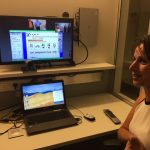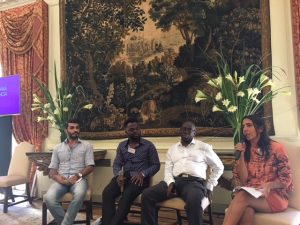 Across the globe, increasing numbers of migrants and refugees are making use of online and mobile resources to catch up with interrupted education and to support their language learning. Our research on the MASELTOV (www.maseltov.eu) and SALSA (www.open.ac.uk/blogs/salsa/) projects has demonstrated that mobile social learning is very well aligned with the needs of newcomers to a town or city, supporting their language learning and social inclusion. But not enough newcomers have the chance to experience this kind of learning, despite many of them having ready access to smartphones.
Across the globe, increasing numbers of migrants and refugees are making use of online and mobile resources to catch up with interrupted education and to support their language learning. Our research on the MASELTOV (www.maseltov.eu) and SALSA (www.open.ac.uk/blogs/salsa/) projects has demonstrated that mobile social learning is very well aligned with the needs of newcomers to a town or city, supporting their language learning and social inclusion. But not enough newcomers have the chance to experience this kind of learning, despite many of them having ready access to smartphones.
We shared our experiences from these and other projects at a recent British Council conference on “Language for Resilience” (argentina.britishcouncil.org/lenguas-para-la-resiliencia) held in Buenos Aires. Argentina has an outstanding track record in welcoming refugees and we were able to admire the efficacy of their online Spanish language teaching which reaches refugees dispersed across the country. The conference, sponsored by the UN Refugee Agency (UNHCR) and the International Organization for Migration (IOM), brought together leaders of civil society, international organizations, academics, government representatives and teachers, to share best practices, approaches, and principles.  In one session, refugees spoke about their everyday experiences and their use of mobiles. In the face of the current refugee crisis, language programmes have the potential to increase resilience at all levels of a community, and appropriate use of technology can extend the reach and scope of these initiatives. But more needs to be done to facilitate effective use of technology and remove multiple barriers to more widespread use.
In one session, refugees spoke about their everyday experiences and their use of mobiles. In the face of the current refugee crisis, language programmes have the potential to increase resilience at all levels of a community, and appropriate use of technology can extend the reach and scope of these initiatives. But more needs to be done to facilitate effective use of technology and remove multiple barriers to more widespread use.
In our own context in the UK, it seems very timely to ask what is, and what should be, the role of technology in the language education accessed by migrants and refugees. Anyone interested in this subject is very welcome to come along to our lunchtime roundtable on 11th April at the Migration Museum Project in London (https://www.eventbrite.co.uk/e/technology-enabled-language-education-for-migrants-and-refugees-in-the-uk-tickets-43478014913). The event is free and registration is open now! We look forward to exchanging experiences, learning from one another and deciding what needs to happen next.
Agnes Kukulska-Hulme
Professor of Learning Technology & Communication, LTI,IET